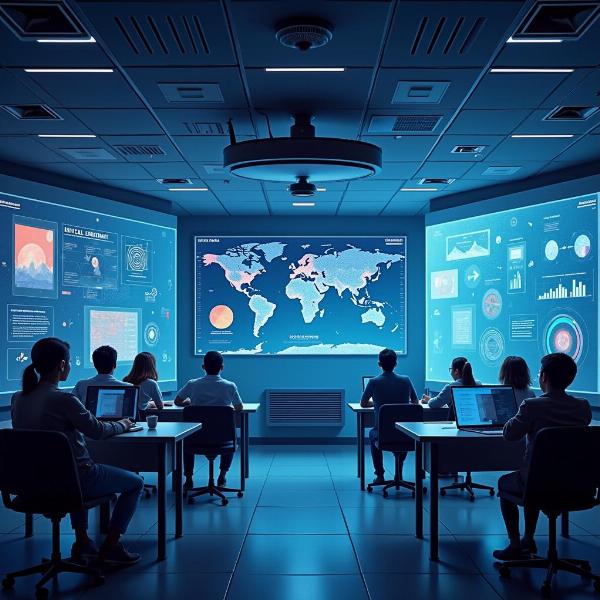Edutainment, a portmanteau of education and entertainment, refers to any medium that combines educational content with entertaining elements. In Hindi, understanding the true meaning of edutainment (शिक्षा-मनोरंजन – shiksha-manoranjan) goes beyond a simple translation. It encompasses a philosophy of learning where knowledge acquisition becomes a joyful and engaging experience. Are you curious about how this concept is transforming the Indian educational landscape? Let’s delve into the fascinating world of edutainment.
Unpacking the Essence of Edutainment (शिक्षा-मनोरंजन)
The core idea behind edutainment is to make learning fun and accessible. It recognizes that traditional methods of rote learning can be tedious and ineffective. By incorporating elements of entertainment, like storytelling, games, and interactive activities, edutainment captures the learner’s attention and fosters a deeper understanding of the subject matter. This approach is particularly beneficial for children, as it transforms learning from a chore into a pleasurable pursuit. But edutainment isn’t just for kids; it can be an effective learning tool for adults as well.
The Growing Significance of Edutainment in India
India, with its diverse population and rich cultural heritage, presents a fertile ground for the growth of edutainment. From interactive museums and science centers to educational television programs and mobile apps, the edutainment landscape in India is rapidly evolving. This approach is particularly relevant in a country where access to quality education can be a challenge. Edutainment offers a cost-effective and engaging way to supplement traditional learning, making education more accessible to a wider audience.
How Edutainment is Transforming Learning
Edutainment is revolutionizing the way we learn by:
- Increasing engagement: By making learning fun, edutainment keeps learners motivated and interested.
- Improving retention: Interactive activities and engaging content help learners retain information more effectively.
- Developing critical thinking skills: Edutainment encourages learners to think critically and solve problems creatively.
- Promoting lifelong learning: By fostering a love for learning, edutainment instills a desire for continuous knowledge acquisition.
Edutainment: Bridging the Gap in Traditional Education
Traditional education often struggles to cater to different learning styles and individual needs. Edutainment offers a more personalized and flexible approach. Through interactive games and simulations, learners can explore concepts at their own pace and receive immediate feedback. This individualized approach can significantly enhance learning outcomes and address the limitations of traditional classroom settings.
What is the Meaning of Edutainment in Hindi?
The Hindi translation of edutainment, शिक्षा-मनोरंजन (shiksha-manoranjan), perfectly captures its essence. Shiksha means education, and manoranjan means entertainment. Together, they represent the harmonious blend of learning and enjoyment.
How Does Edutainment Help Students?
Edutainment caters to different learning styles, making complex topics easier to grasp and promoting active participation, which leads to better understanding and retention.
“Edutainment offers a fantastic way to cater to diverse learners and make learning more engaging,” says Dr. Asha Sharma, an educational psychologist based in Mumbai. “By incorporating elements of fun and play, we can significantly enhance the learning process and improve student outcomes.”
 Future of Edutainment in India
Future of Edutainment in India
Conclusion: Embracing the Power of Edutainment
Edutainment offers a powerful approach to learning that combines the best of education and entertainment. By making learning fun and engaging, edutainment empowers learners of all ages to explore new concepts, develop critical thinking skills, and embrace a lifelong love of learning. The increasing adoption of edutainment in India holds great promise for transforming the educational landscape and creating a more engaging and effective learning experience for everyone.
FAQ:
- What is the difference between education and edutainment? While education focuses on imparting knowledge, edutainment integrates entertainment to make the learning process more engaging and enjoyable.
- What are some examples of edutainment? Examples include educational games, interactive museums, television programs like National Geographic, and documentaries.
- Why is edutainment important in India? Edutainment can play a crucial role in making education more accessible and engaging for a diverse population, especially in areas with limited access to quality education.
- How can I use edutainment in my classroom? Incorporate educational games, interactive activities, and multimedia content into your lessons to make learning more fun and interactive.
- Is edutainment only for children? No, edutainment can be beneficial for learners of all ages, including adults.
- What are the benefits of using edutainment? Edutainment can improve engagement, enhance retention, develop critical thinking skills, and promote lifelong learning.
- How does edutainment address the limitations of traditional education? Edutainment offers a more personalized and flexible approach to learning, catering to different learning styles and individual needs.
Discover More About Language and Culture on Meaning-Hindi.in
You might also find these articles helpful:
- [Link to a related article on Meaning-Hindi.in – if available]
- [Link to another related article on Meaning-Hindi.in – if available]
Meaning-Hindi.in is your one-stop solution for all your Hindi translation needs. We specialize in business, legal, technical, website, educational, and specialized translation services. Our expert team ensures accurate and culturally sensitive translations, helping you bridge the communication gap effectively. For all your translation needs, contact us at [email protected] or call us at +91 11-4502-7584. Meaning-Hindi.in is dedicated to providing high-quality translation services to meet your diverse communication needs.